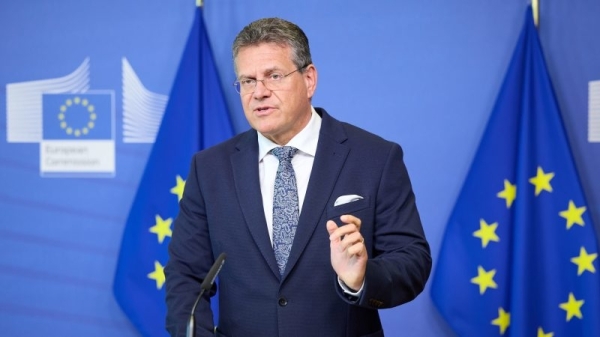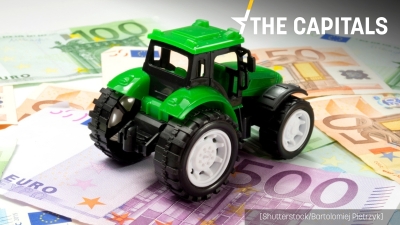Joint purchasing platform matches 11 bcm of gas with European buyers

Europe’s joint gas purchasing platform, which aims to match gas demand with the best supply deals, has found offers totalling 10.9 billion cubic metres, almost fulfilling its legal obligation, the European Commission announced on Tuesday (16 May).
Under the gas storage law, EU countries must fill 15% of their storage capacity, totalling 13.5 billion cubic metres (bcm) of gas, using the platform.
The first tender process has already matched European demand with offers equalling almost 11 bcm with liquified natural gas representing just over 20% and pipeline gas just under 80% of this.
“This is nothing short of a remarkable success,” said Maroš Šefčovič, the European Commission vice-president in charge of interinstitutional relations who is in charge of overseeing the platform.
“It shows that we were right to pool our demand, to use Europe’s collective pooling power and to work together to fill our gas storages for next winter,” he added.
The platform was set up to ensure Europe’s energy security ahead of the winter as well as to lower soaring prices in light of supply constraints and dwindling imports from Russia.
“We believe that we are also contributing to the tendency which we see now on the gas market, which is clearly demonstrating that prices are getting lower, and they are more competitive for the European customers,” said Šefčovič.
By pooling European demand, Brussels aims to increase Europe’s purchasing power on tight international markets, something that particularly benefits smaller countries.
“The matching in the most vulnerable countries is particularly positive. For instance, the gas deliveries requested by Bulgaria have been fully matched. In Ukraine and Moldova, 100% and 80% of the volumes requested have been matched respectively,” said Šefčovič.
“This is a great outcome for an instrument that did not exist some five months ago,” he added.

EU launches first round of tenders to jointly buy gas
The European Commission on Wednesday (10 May) launched the first round of tenders for gas sellers to link with EU buyers on the joint gas purchasing platform to help maintain security of supply and tackle high energy prices.
Supply outpaces demand
According to Šefčovič, the platform has become a new “dynamic marketplace” for gas in Europe that will reinforce the continent’s energy security as it looks to phase out Russian supplies.
The platform currently has more than 110 companies representing gas operators and industrial consumers signed up to it from all across the EU as well as countries like Ukraine, Moldova and the Western Balkans, which are members of the Energy Community.
The first round of tenders saw supply outpace demand, with offers totalling 13.4 bcm from 25 different suppliers, battling to match the call for 11.6 bcm. Some offers were not accepted, due to oversupply and some offers being better than others, he explained.
Buyers and suppliers will now go off the platform to finalise the deals, something that should happen in the second half of June.
However, the contracts are not yet guaranteed and companies in charge of securing supplies are free to walk away if they find a better deal.

To buy or not to buy: Europe’s joint gas purchasing
Welcome to EURACTIV’s Green Brief, our weekly selection of energy and environment news from across Europe. To subscribe, follow this link. You can also subscribe to our daily newsletter here and to our comprehensive weekly update here.
The …
EU cannot be ‘complacent’
Despite the success, Šefčovič warned that the EU should not be complacent, adding that the war in Ukraine is still ongoing and that Europe “cannot be satisfied” with current energy prices.
Europe still has to secure at least 2.6 bcm of gas to meet the legal obligation under the storage regulation and there will be four more tendering processes before the end of the year to do this.
Šefčovič told journalists he will continue reaching out to international gas suppliers to attract more supply offers in future rounds. For instance, the European Commission has met with Azerbaijan over gas supplies, although the EU’s dealings with the country have been criticised by human rights groups.
Read more with EURACTIV




